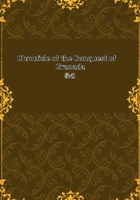
第61章
The Spanish cavaliers who had survived the memorable massacre among the mountains of Malaga, although they had repeatedly avenged the deaths of their companions, could not forget the horror and humiliation of their defeat. Nothing would satisfy them but a second expedition of the kind to carry fire and sword throughout a wide part of the Moorish territories, and leave the region which had triumphed in their disaster a black and burning monument of their vengeance. Their wishes accorded with the policy of the king to destroy the resources of the enemy; every assistance was therefore given to their enterprise.
In the spring of 1484 the ancient city of Antiquera again resounded with arms; numbers of the same cavaliers who had assembled there so gayly the preceding year came wheeling into the gates with their steeled and shining warriors, but with a more dark and solemn brow than on that disastrous occasion, for they had the recollection of their slaughtered friends present to their minds, whose deaths they were to avenge.
In a little while there was a chosen force of six thousand horse and twelve thousand foot assembled in Antiquera, many of them the very flower of Spanish chivalry, troops of the established military and religious orders and of the Holy Brotherhood.
Precautions had been taken to furnish this army with all things needful for its perilous inroad. Numerous surgeons accompanied it, who were to attend upon the sick and wounded without charge, being paid for their services by the queen. Isabella also, in her considerate humanity, provided six spacious tents furnished with beds and all things needful for the wounded and infirm. These continued to be used in all great expeditions throughout the war, and were called the Queen's Hospital. The worthy father, Fray Antonio Agapida, vaunts this benignant provision of the queen as the first introduction of a regular camp hospital in campaigning service.
Thus thoroughly prepared, the cavaliers issued forth from Antiquera in splendid and terrible array, but with less exulting confidence and vaunting ostentation than on their former foray; and this was the order of the army: Don Alonso de Aguilar led the advance guard, accompanied by Don Diego Fernandez de Cordova, the alcayde de los Donceles, and Luis Fernandez Puerto Carrero, count of Palma, with their household troops. They were followed by Juan de Merlo, Juan de Almara, and Carlos de Biezman of the Holy Brotherhood, with the men-at-arms of their captaincies.
The second battalion was commanded by the marques of Cadiz and the master of Santiago, with the cavaliers of Santiago and the troops of the house of Ponce Leon; with these also went the senior commander of Calatrava and the knights of that order, and various other cavaliers and their retainers.
The right wing of this second battalion was led by Gonsalvo de Cordova, afterward renowned as grand captain of Spain; the left by Diego Lopez de Avila. They were accompanied by several distinguished cavaliers and certain captains of the Holy Brotherhood with their men-at-arms.
The duke of Medina Sidonia and the count de Cabra commanded the third battalion, with the troops of their respective houses. They were accompanied by other commanders of note with their forces.
The rear-guard was brought up by the senior commander and knights of Alcantara, followed by the Andalusian chivalry from Xeres, Ecija, and Carmona.
Such was the army that issued forth from the gates of Antiquera on one of the most extensive "talas," or devastating inroads, that ever laid waste the kingdom of Granada.
The army entered the Moorish territory by the way of Alora, destroying all the cornfields, vineyards, and orchards and plantations of olives round that city. It then proceeded through the rich valleys and fertile uplands of Coin, Cazarabonela, Almexia, and Cartama, and in ten days all those fertile regions were a smoking and frightful desert. Hence it pursued its slow and destructive course, like the stream of lava of a volcano, through the regions of Pupiana and Alhendin, and so on to the vega of Malaga, laying waste the groves of olives and almonds and the fields of grain, and destroying every green thing. The Moors of some of those places interceded in vain for their groves and fields, offering to deliver up their Christian captives. One part of the army blockaded the towns, while the other ravaged the surrounding country. Sometimes the Moors sallied forth desperately to defend their property, but were driven back to their gates with slaughter and their suburbs pillaged and burnt. It was an awful spectacle at night to behold the volumes of black smoke mingled with lurid flames rising from the burning suburbs, and the women on the walls of the town wringing their hands and shrieking at the desolation of their dwellings.